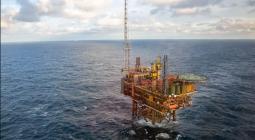World’s largest oil companies ‘way off track’ on emissions goals, report finds
Despite splashy climate pledges, firms including BP and Saudi Aramco have plans to expand fossil fuel production, says analysis
In recent years, virtually all of the world’s largest oil companies have made splashy climate pledges. But when it comes to actually slashing emissions, those firms are “way off track”, a new report has found.
The analysis from the thinktank Carbon Tracker assessed the production and transition plans of 25 of the world’s largest oil and gas companies. None align with the central goal of the 2015 Paris climate agreement to keep global warming “well under” 2 degrees above pre-industrial levels, the report found.
“Companies worldwide are publicly stating they are supportive of the goals of the Paris-Agreement, and claim to be part of the solution in accelerating the energy transition,” said Maeve O’Connor, analyst at Carbon Tracker and co-author of the report. “Unfortunately, however, we see that none are currently aligned with the goals of the Paris agreement.”
The authors examined the firms’ exploration and production plans, investments, carbon emission reduction targets and executive bonus policies, placing the results on a Paris alignment scorecard.
They assigned each company a letter grade from A to H, wherein an A is “potentially aligned” with the Paris agreement goals and H is the “furthest from being aligned”, with activities and strategy consistent with cataclysmic warming of 2.4C above pre-industrial levels.
By the authors’ metrics, each company received a failing grade. There are “are clear differences between companies”, however, O’Connor noted.
The highest ranked company, BP, received a D grade. Saudi Aramco, Brazil’s Petrobras, and ExxonMobil received G grades, and at the bottom was ConocoPhillips, the only firm to receive an H.
BP, Saudi Aramco, Petrobras, ExxonMobil and ConocoPhillips were not immediately available for comment.
Every firm assessed besides the gas company Chesapeake Energy has plans to expand fossil-fuel production in the near term, the analysis found.
BP is the only company aiming to cut its fossil fuel production by 2030, while just three companies – Spain’s Repsol, Norway’s Equinor, and the UK-based Shell – have plans to keep production levels flat, the report found. ConocoPhillips, meanwhile, is aiming to increase production by 47% by the end of the decade, compared with its 2022 output, according to the analysis.
The analysis comes as oil and gas companies are publicly reneging on their climate commitments. Shell last week watered down earlier emissions targets, following BP, which made a similar announcement last year. In October, ExxonMobil also made a deal to buy the shale group Pioneer Natural Resources, while Chevron announced plans to acquire the Texas oil company Hess – marking two of the country’s largest oil and gas deals in decades.
Previous studies have also found that big oil’s climate plans are insufficient to achieve global climate goals, including 2023 analysis from research and advocacy group Oil Change International. Both reports, said David Tong, global industry campaign manager at Oil Change International, provide evidence that “governments must step in to manage the phaseout of the oil and gas industry”.
“No one would trust an arsonist promising to light fewer fires, and no one should trust big oil and gas climate pledges and plans,” he said.
The report launch also coincided with the annual Cera Week in Houston, where oil and gas executives have been deriding fossil fuel phaseout efforts and timelines.
Carbon Tracker says its new report could help hold executives accountable.
“This new scorecard enables investors to assess companies’ actions relative to peers, and to ask tough questions of company leadership on the realities of the energy transition and addressing climate change,” said Mike Coffin, head of oil, gas and mining research at the thinktank.
Cover photo: Gas flares at BP's Grangemouth oil refinery at dusk in Scotland. Photograph: Murdo Macleod/The Guardian




